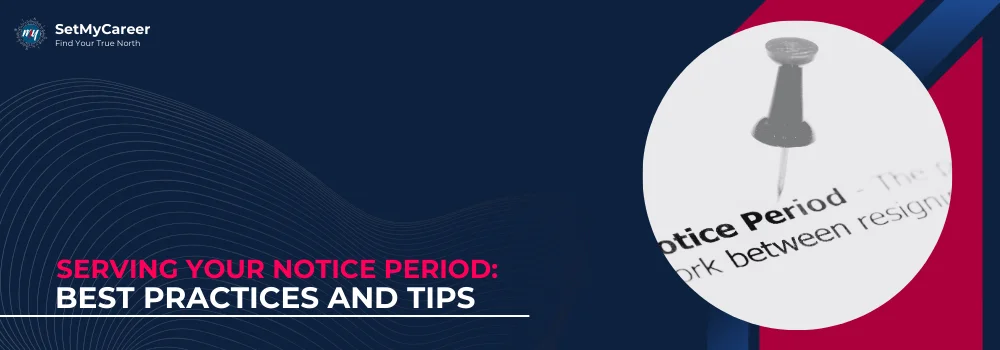
Published by Dr. Nandkishore Rathi on 10 May 2025
Chief Career Navigator
Dr. Nandkishore Rathi is passionate about identifying people's passions and helping them create and lead successful and fulfilling careers. With 30+ years of experience and interactions with thousands of students, academicians, and corporate executives, he has developed a range of career services aimed at benefiting individuals seeking a breakthrough in their professional lives.
Your exit strategy matters — here’s how to serve your notice period the right way.

You’ve finally taken the leap, maybe after weeks of overthinking, awkward late-night job searches, or staring blankly at your current desk wondering, "Is this it for me?" you’ve put in your resignation, and boom, you’re in the notice period zone. It’s that weird in-between phase where you're mentally halfway out, but still showing up every day.
You might be dealing with mixed feelings and other hassles of job change; guilt, relief, anxiety about handovers, or just not knowing how to “exit right.” And there is a right and wrong way, because here's the truth: how you exit a job says just as much about you as how you enter one.
This blog is your go-to guide to making the most of your notice period, professionally, practically, and with your reputation (and peace of mind) intact.
A notice period is the time between officially resigning and your final working day. It gives your company time to find a replacement or wrap things up, and it gives you a chance to leave on a high note.
This short window matters more than you might think. It can impact future references, networking opportunities, and even how you feel stepping into your next role. Treat it like the final scene of a good movie: make your exit count.

Use these smart tips to exit with grace and respect
Exit Like ProBe Professional Until the Very Last Day
It might be tempting to slow down once you've handed in your resignation, but resist the urge. This is not the time to coast. Keep showing up on time, meeting deadlines, and participating in meetings and follow all official and unofficial notice period rules. Think of it as your professional legacy, how do you want to be remembered by your team?
People have long memories. Leaving with your head held high builds trust and respect.
Create a Solid Handover Document
Your handover is like a map for whoever picks up your work. Make it as clear and helpful as possible. Include:
Current project status
Upcoming deadlines
Key contacts and login info (if allowed)
Ongoing issues and suggestions for next steps
Offer to walk your manager or replacement through it. It shows maturity and helps everyone stay on track.
Communicate Clearly and Often
Don’t just fade into the background. Let your manager know what you’re working on and what you'll finish before you go. Be transparent about your availability. If someone new is taking over, help set clear expectations for them too.
Also, avoid gossip or venting about your exit. Keep conversations respectful and professional.
Support Your Replacement (If There Is One)
If a replacement has been hired before your last day, offer to train them or at least share some pointers. You don’t need to go overboard, just be helpful. Things like workflows, helpful shortcuts, or things you wish you'd known earlier go a long way.
This helps both the company and your successor. Plus, it reflects well on you.
Stay Engaged with the Team
Even if you're checked out mentally, avoid isolating yourself. Keep showing up in meetings, chats, or team updates. Offer to help where you can.
Your team will notice your attitude, and it could influence whether they want to stay in touch or recommend you down the line
Do Not Burn Bridges
You might be leaving because of a tough boss or a bad experience, but try not to air grievances during your final days. Be diplomatic, especially in public settings like team meetings or group chats.
Instead, thank people for their support, learnings, and collaboration. This is an integral part of professional networking. Leave the drama behind.
Remember: industries are small. People talk.
Writing a Polite and Professional Resignation Email
Here’s a quick list of things to avoid:
Ghosting: Taking too many leaves or disappearing without updates
Oversharing: Talking too much about your new role or pay
Badmouthing: Criticizing leadership or teammates
Being lazy: Missing deadlines or ignoring tasks
Keep things clean and classy. You’re almost out, don’t ruin your reputation now
Exit Interviews: Be Honest, But Tactful
Your resignation letter should be short, polite, and professional. Here’s a rough outline of what that can look like:
Please accept this letter as formal notice of my resignation. As per my contract, my last working day will be xyz.
I want to thank you and the team for the opportunities and learning I’ve had during my time here.
Please let me know how I can support the transition.
Keep it simple and positive. Don’t go into too much detail about why you’re leaving.
Wrap Up Your Projects Properly
Before you leave:
Finish what you can.
Document the rest clearly.
Save important files in shared folders.
Label everything so it’s easy to find.
This isn’t just helpful, it shows responsibility and maturity. It also saves your team from a lot of post-exit stress.
Say Thoughtful Goodbyes
A short and sweet goodbye message can go a long way. Here’s our two cents:
It’s a small gesture, but it leaves a lasting impression.
Prep Yourself for What’s Next
This is also a good time to:
Reflect on what you learned in this role.
Think about what you want from your next one.
Organize documents or certificates you may need.
Take a breather, if possible, before the next hustle.
Give yourself a clean mental slate.
Your notice period isn’t just the end of one job, it’s the beginning of the next chapter in your career journey. How you exit says a lot about your work ethic, attitude, and maturity. By staying professional, supportive, and respectful, you not only make life easier for your current team, you also build a positive reputation that travels with you.
So finish strong, keep your head high, and walk out that door knowing you handled your exit like a true professional.
No. 14/595, 1st Floor, Nanjappa Reddy Layout, Koramangala 8th Block, Bangalore 560095